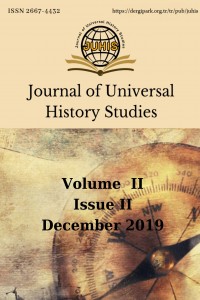Öz
Dünya tarihinin iki kadim milleti olan Polonyalılar/Lehler ve Türklerin ikili ilişkilerinde hem Osmanlı Devleti hem de Türkiye Cumhuriyeti’nin kuruluş döneminde temel dış dinamiklerden biri Çarlık Rusya/Sovyet Rusya’nın izlediği dış politika olmuştur. 20. yy.’ın başında Türkiye ve Polonya iç politik ortamında köklü değişimler-dönüşümler yaşanmasına rağmen her iki devletin genel dış politika stratejilerinde ve birbirleriyle ilişkilerinde Rus/Sovyet realitesi varlığını korumaya devam etmiştir. Osmanlı’nın Polonya ile ilişkilerini temel dış tehdit unsuru olan Rusya’ya karşı denge stratejisi belirlerken, Milli Mücadele döneminde TBMM-Polonya ilişkilerinde baş müttefik Sovyet Rusya’nın muvafakati büyük oranda belirleyici olmuştur. Bu yönüyle Türkiye-Polonya ilişkilerinde aynı temel dış dinamiğin -olumlu ya da olumsuz-süreklilik arz etmesine yol açan etkenlerin, söz konusu zaman kesitinde uluslararası sistemin devamlılığı ve Polonya-Türkiye-Sovyet Rusya coğrafyasının da içinde bulunduğu bölgede algılanan dış tehdit unsurlarının sabit durumu olduğu söylenebilir. Bu çalışmada Türkiye-Polonya ilişkilerinin tesisine giden sürece dair ana kesitler incelenmiş, söz konusu evrede Sovyet Rusya-Polonya ve Türkiye-Sovyet Rusya arasında yaşanan gelişmelerin analiziyle bir dış dinamik olarak Sovyet Rusya’nın Türkiye-Polonya ilişkilerine etkisi değerlendirilmeye çalışılmıştır.
Anahtar Kelimeler
Kaynakça
- [1] BOA, Meclis-i Vükela Mazbatası, 218/26.
- [2] CA A: III-10-b-2 D: 47 F: 21-7.
- [3] CA A: III-10-b-2, D: 47, F: 21-5.
- [4] CA A: III-10-b-2-, D: 47, F: 21-8.
- [5] CA A: III-10-b-2-, D: 47, F: 21-9.
- [6] CA A: III-10-b-2-, D: 47, F: 21-10.
- [7] CA A: III-10-b-2-, D: 47, F: 21-11.
- [8] CA A: III-10-b-2, D: 47, F: 21-14.
- [9] CA A: III-10-b-2, D: 47, F: 21-16.
- [10] Adalı, Emrah (2013), Cumhuriyet Dönemi Türkiye-Polonya İlişkileri, Kocaeli Üniversitesi Yayımlanmamış Yüksek Lisans Tezi, Kocaeli.
- [11] Arı, Tayyar (2002), Uluslararası İlişkiler Teorileri, Alfa Yayınları, İstanbul.
- [12] Arık, Sabire (2010). Kuruluştan XVII. Yüzyıla Polonya Tarihi, Köksav Yayınları, Ankara.
- [13] Armaoğlu, Fahir (1992), 20. Yüzyıl Siyasi Tarihi, C.1, Türkiye İş Bankası Yayınları, İstanbul.
- [14] Atatürk’ün Bütün Eserleri (2002), C. 8, Kaynak Yayınları, İstanbul.
- [15] Baykal, Bekir Sıtkı (1985), “Tarih Boyunca Osmanlı-Polonya İlişkileri”, Ord. Prof. Yusuf Bayur’a Armağan, TTK Yayınları, Ankara (247-255).
- [16] Beydilli, Kemal (2007), “Polonya”, TDV İslam Ansiklopedisi, İstanbul.
- [17] Chmielowska, Danuta (2002), “Birinci Dünya Savaşı’nın Polonya-Türkiye İlişkilerindeki Etkileri ve Politik Neticeleri”, XIV. Türk Tarih Kongresi, Kongreye Sunulan Bildiriler Kitabı, C. III, TTK Basımevi, Ankara (137-142).
- [18] Chmielowska, Danuta (2006), “Polonya Cumhuriyeti ve Türkiye Cumhuriyeti Arasında Diplomatik İlişkilerin Başlaması (1924–1927)”, XV. Türk Tarih Kongresi, Kongreye Sunulan Bildiriler Kitabı, C. V, TTK Yayınları, Ankara (2245-2252).
- [19] Dilek, Mehmet Sait (2013), “TBMM Hükümeti ile Polonya Cumhuriyeti (Lehistan) Arasında 23 Temmuz 1923 Tarihinde İmzalanan Antlaşmalar ve Tarafların Dış Politika Yaklaşımları”, Turkish Studies, Volume 8/9, Summer (1127-1147).
- [20] Dominik, M. A. Paulina (2019), “Polonezköy ve Leh Göçmenler”, Türkiye-Polonya İlişkilerinin 600. Yıldönümü Uluslararası Sempozyum Bildiriler Kitabı, Beykoz Belediyesi, İstanbul.
- [21] Horak, Stephan (1964), Poland International Affairs, Indiana University, Bloomington. [22] Kołodziejczyk, Dariusz (1999), “Polonya ve Osmanlı Devleti Arasında Tarih Boyunca Siyasi ve Diplomatik İlişkiler”, Savaş ve Barış 15–19. Yüzyıl Osmanlı-Lehistan İlişkileri, Kültür ve Turizm Bakanlığı Yayınları, İstanbul (s. 21-33).
- [23] Kuran, Akdes Nimet (1999), Rusya Tarihi, TTK Yayınları, Ankara.
- [24] Łątka, Jerzy (1964), Polonya-Türkiye, Çev. Bogumita Chochlinska-Mustafa Turhan, Yayın Yeri Yok.
- [25] Müderrisoğlu, Alptekin (1990), Kurtuluş Savaşı’nın Malî Kaynakları, Atatürk Araştırma Merkezi, Ankara.
- [26] Norman, Davies (2001), The Heart of Europe: The Past in Poland’s Present, Oxford University Press, New York.
- [27] Reychman, Jan (1964), Polonya ile Türkiye Arasında Diplomatik Münasebetlerin 550. Yıldönümü, Polonya Halk Cumhuriyeti Büyükelçiliği, Ankara.
- [28] Schulze, Hagen (2005), Avrupa’da Ulus ve Devlet, Çev. T. Bender, Literatür Yayınları, İstanbul.
- [29] Soysal, İsmail (2000), Türkiye’nin Siyasa Antlaşmaları, TTK Yayınları, Ankara.
- [30] Topaktaş, Hacer (2014), “Polonya’nın Türkiye’deki İlk Daimi Elçiliğinin Kurulma Süreci: Tarihsel Dinamikler, Uluslararası İlişkiler, Sayı 43, Güz (105-121).
- [31] Topraktaş, Hacer (2015), “Osmanlı Devleti’nin Doğu Avrupa Politikalarında Taksim Sonrası Polonya Üzerine Bir Değerlendirme”, Karadeniz Araştırmaları Dergisi, Sayı 45, Bahar(211-231).
- [32] Tür, Özlem ve Salık, Nuri (2017), “Uluslararası İlişkilerde “Küçük Devletler”: Gelişimi, Tanımı, Dış Politika ve İttifak Davranışları”, Uluslararası İlişkiler Dergisi, Sayı 53 (3-22).
- [33] Türk-Rus İlişkilerinde 500 Yıl (1999), TTK Yayınları, Ankara.
- [34] Uçarol, Rifat (2019), Siyasi Tarih, Der Yayınları, İstanbul.
- [35] Wallerstein, Immanuel (2011), Dünya Sistemleri Analizi, Çev. Ender Abadoğlu, BGST Yayınları, İstanbul.
- [36] Yetim, Fahri (2011), “Milli Mücadele Dönemi Türk Dış Politikasında İlkesel Yaklaşımlar ve Uygulama Örnekleri”, Atatürk Araştırma Merkezi Dergisi, Sayı 79, Mart (74-95).
Öz
Foreign policy pursued by Tsarist Russia / Soviet Russia was one of the main external dynamics over two ancient nations of the world history, Poles’ and Turks’ bilateral relations, during both the Ottoman Empire era and the formative period of the Republic of Turkey. Even though domestic political environments in both Poland and Turkey experienced drastic changes-transformations in the beginning of 20th century, the Russian/Soviet reality continued to maintain its presence over their grand foreign policy strategies and bilateral relations. It was the act of balancing strategy against the main external threat, Russia that determined the relations between Poland and the Ottoman Empire. During the National Struggle (The Turkish War of Independence), the consensus with the chief ally, Soviet Russia, was largely decisive in the Turkish Grand National Assembly-Poland relations. In this respect, it may be argued that what caused the continuity in the same basic external dynamics –positive or negative- of Turkey-Poland relations, was the continuity of international system during aforementioned period and the stable conditions of external threat elements in the region that includes Poland-Turkey-Soviet Russia. This study examines the main sections of the process that leads to the establishment of Turkey-Poland relations and through the analysis of developments in bilateral relations between Soviet Russia-Poland and Turkey-Soviet Russia, the influence of Soviet Russia as an external dynamic over Turkey-Poland relations is evaluated.
Anahtar Kelimeler
Kaynakça
- [1] BOA, Meclis-i Vükela Mazbatası, 218/26.
- [2] CA A: III-10-b-2 D: 47 F: 21-7.
- [3] CA A: III-10-b-2, D: 47, F: 21-5.
- [4] CA A: III-10-b-2-, D: 47, F: 21-8.
- [5] CA A: III-10-b-2-, D: 47, F: 21-9.
- [6] CA A: III-10-b-2-, D: 47, F: 21-10.
- [7] CA A: III-10-b-2-, D: 47, F: 21-11.
- [8] CA A: III-10-b-2, D: 47, F: 21-14.
- [9] CA A: III-10-b-2, D: 47, F: 21-16.
- [10] Adalı, Emrah (2013), Cumhuriyet Dönemi Türkiye-Polonya İlişkileri, Kocaeli Üniversitesi Yayımlanmamış Yüksek Lisans Tezi, Kocaeli.
- [11] Arı, Tayyar (2002), Uluslararası İlişkiler Teorileri, Alfa Yayınları, İstanbul.
- [12] Arık, Sabire (2010). Kuruluştan XVII. Yüzyıla Polonya Tarihi, Köksav Yayınları, Ankara.
- [13] Armaoğlu, Fahir (1992), 20. Yüzyıl Siyasi Tarihi, C.1, Türkiye İş Bankası Yayınları, İstanbul.
- [14] Atatürk’ün Bütün Eserleri (2002), C. 8, Kaynak Yayınları, İstanbul.
- [15] Baykal, Bekir Sıtkı (1985), “Tarih Boyunca Osmanlı-Polonya İlişkileri”, Ord. Prof. Yusuf Bayur’a Armağan, TTK Yayınları, Ankara (247-255).
- [16] Beydilli, Kemal (2007), “Polonya”, TDV İslam Ansiklopedisi, İstanbul.
- [17] Chmielowska, Danuta (2002), “Birinci Dünya Savaşı’nın Polonya-Türkiye İlişkilerindeki Etkileri ve Politik Neticeleri”, XIV. Türk Tarih Kongresi, Kongreye Sunulan Bildiriler Kitabı, C. III, TTK Basımevi, Ankara (137-142).
- [18] Chmielowska, Danuta (2006), “Polonya Cumhuriyeti ve Türkiye Cumhuriyeti Arasında Diplomatik İlişkilerin Başlaması (1924–1927)”, XV. Türk Tarih Kongresi, Kongreye Sunulan Bildiriler Kitabı, C. V, TTK Yayınları, Ankara (2245-2252).
- [19] Dilek, Mehmet Sait (2013), “TBMM Hükümeti ile Polonya Cumhuriyeti (Lehistan) Arasında 23 Temmuz 1923 Tarihinde İmzalanan Antlaşmalar ve Tarafların Dış Politika Yaklaşımları”, Turkish Studies, Volume 8/9, Summer (1127-1147).
- [20] Dominik, M. A. Paulina (2019), “Polonezköy ve Leh Göçmenler”, Türkiye-Polonya İlişkilerinin 600. Yıldönümü Uluslararası Sempozyum Bildiriler Kitabı, Beykoz Belediyesi, İstanbul.
- [21] Horak, Stephan (1964), Poland International Affairs, Indiana University, Bloomington. [22] Kołodziejczyk, Dariusz (1999), “Polonya ve Osmanlı Devleti Arasında Tarih Boyunca Siyasi ve Diplomatik İlişkiler”, Savaş ve Barış 15–19. Yüzyıl Osmanlı-Lehistan İlişkileri, Kültür ve Turizm Bakanlığı Yayınları, İstanbul (s. 21-33).
- [23] Kuran, Akdes Nimet (1999), Rusya Tarihi, TTK Yayınları, Ankara.
- [24] Łątka, Jerzy (1964), Polonya-Türkiye, Çev. Bogumita Chochlinska-Mustafa Turhan, Yayın Yeri Yok.
- [25] Müderrisoğlu, Alptekin (1990), Kurtuluş Savaşı’nın Malî Kaynakları, Atatürk Araştırma Merkezi, Ankara.
- [26] Norman, Davies (2001), The Heart of Europe: The Past in Poland’s Present, Oxford University Press, New York.
- [27] Reychman, Jan (1964), Polonya ile Türkiye Arasında Diplomatik Münasebetlerin 550. Yıldönümü, Polonya Halk Cumhuriyeti Büyükelçiliği, Ankara.
- [28] Schulze, Hagen (2005), Avrupa’da Ulus ve Devlet, Çev. T. Bender, Literatür Yayınları, İstanbul.
- [29] Soysal, İsmail (2000), Türkiye’nin Siyasa Antlaşmaları, TTK Yayınları, Ankara.
- [30] Topaktaş, Hacer (2014), “Polonya’nın Türkiye’deki İlk Daimi Elçiliğinin Kurulma Süreci: Tarihsel Dinamikler, Uluslararası İlişkiler, Sayı 43, Güz (105-121).
- [31] Topraktaş, Hacer (2015), “Osmanlı Devleti’nin Doğu Avrupa Politikalarında Taksim Sonrası Polonya Üzerine Bir Değerlendirme”, Karadeniz Araştırmaları Dergisi, Sayı 45, Bahar(211-231).
- [32] Tür, Özlem ve Salık, Nuri (2017), “Uluslararası İlişkilerde “Küçük Devletler”: Gelişimi, Tanımı, Dış Politika ve İttifak Davranışları”, Uluslararası İlişkiler Dergisi, Sayı 53 (3-22).
- [33] Türk-Rus İlişkilerinde 500 Yıl (1999), TTK Yayınları, Ankara.
- [34] Uçarol, Rifat (2019), Siyasi Tarih, Der Yayınları, İstanbul.
- [35] Wallerstein, Immanuel (2011), Dünya Sistemleri Analizi, Çev. Ender Abadoğlu, BGST Yayınları, İstanbul.
- [36] Yetim, Fahri (2011), “Milli Mücadele Dönemi Türk Dış Politikasında İlkesel Yaklaşımlar ve Uygulama Örnekleri”, Atatürk Araştırma Merkezi Dergisi, Sayı 79, Mart (74-95).
Ayrıntılar
| Birincil Dil | Türkçe |
|---|---|
| Bölüm | Araştırma Makaleleri |
| Yazarlar | |
| Yayımlanma Tarihi | 14 Aralık 2019 |
| Gönderilme Tarihi | 12 Kasım 2019 |
| Kabul Tarihi | 2 Aralık 2019 |
| Yayımlandığı Sayı | Yıl 2019 Cilt: 2 Sayı: 2 |
Journal of Universal History Studies © 2018 by Sabit Dokuyan is licensed under CC BY-NC-SA 4.0



